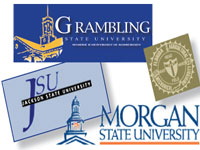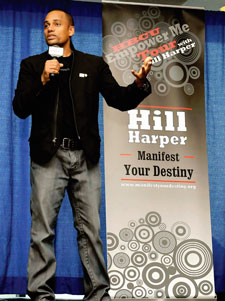Despite naysayers, Black Colleges still relevant
By Jesse Muhammad -Staff writer- | Last updated: Jan 30, 2011 - 12:41:14 PMWhat's your opinion on this article?
(FinalCall.com) - The nation's Historically Black Colleges and Universities (HBCUs) have served this country since 1837.

|
Many highly successful CEOs, doctors, entertainers, educators, lawyers, engineers, and politicians graduated from these institutions.
Today, Black students have many more choices—leading again to questions about the relevancy, value and role of HBCUs and their future in a so-called post racial America.
“I don't understand how someone can even question the relevancy of HBCUs. HBCUs are vitally important to the entire spectrum of the educational system in America,” Dr. Julianne Malveaux told The Final Call. She serves as president of Bennett College for Women in Greensboro, N.C.
President Obama has set a goal for the country to have the highest proportion of college graduates in the world by 2020 and publically stated HBCUs are essential to achieving the target. There are 105 private and public HBCUs in the U.S., concentrated mostly throughout the Southeast, servicing over 300,000 undergraduate and graduate students.
"People try to measure the relevancy of HBCUs, but do you factor in that we're receiving a lot of first generation college students? Do you factor in the academic deficiencies coming onto the campus? We service students on Black campuses in a way that other schools don't,” added Dr. Malveaux, a noted economist.

Actor and best-selling author Hill Harper, speaks Nov. 2008, in Dallas. The Wachovia Foundation
and UNCF together launched the “HBCU Empower Me Tour,” focused on educating
and inspiring middle school, high school and college students through information on securing
money to attend college, fi nancial literacy and job-related skills. (AP Photo/Earl Gibson III)
|
Dr. Jones also founded the largest organization of Black male Ph.D.-holders called the Brothers of the Academy. “Without the contributions of HBCUs, where would this country be? People cannot overlook the significant individuals that these schools produce every year,” Dr. Jones told The Final Call.
Howard University film student Akilah Muhammad greatly opposes the notion that HBCUs have become extinct. “I chose to attend a Black institution because of my family and it has met all of my expectations. Being here has given so many of us a sense of self,” Ms. Muhammad told The Final Call.
“Those who think HBCUs have lost their impact must not be interviewing students on our campuses. And for those who think that we are missing out on diversity by attending a Black college should come see the diversity that exists within Black students from around the world,” said Ms. Muhammad, who is from Houston.
“There are so many generational stereotypes of Black colleges that are totally false. There are things you get on these campuses you can't get anywhere else, and I'm happy I chose a HBCU,” said Keiser Johnson of Brooklyn, a freshman psychology major at Howard.
“HBCUs are as relevant today as they were at their inception. Students still get a world class education without the burden of diversity that they would find at majority White schools. Plus there is still a great deal of racism,” said Jarrett Carter, a 2003 graduate of Morgan State University.
Mr. Carter's displeasure with how HBCUs have been improperly portrayed in mainstream media motivated him to create the informational website HBCUdigest.com in January 2010.
“We don't tell our stories well enough or consistent enough. We have HBCU graduates doing extraordinary things in science, entertainment, and the arts. But how will we know that if we don't communicate it?” asked Mr. Carter.
Measuring HBCU effectiveness
Late last year, in a column titled “Black Colleges Need a New Mission,” Wall Street Journal editorial board member Jason Riley argued HBCUs have become ineffective.
“Black colleges are at a crossroads. At one time black colleges were an essential response to racism. They trained a generation of civil rights lawyers and activists who helped end segregation. Their place in U.S. history is secure. Today, however, dwindling enrollments and endowments indicate that fewer and fewer blacks believe that these schools, as currently constituted, represent the best available academic choice,” wrote Mr. Riley.
Members of the National Association for Equal Opportunity responded to the column: The group noted that HBCUs confer 22 percent of all bachelor degrees earned by Blacks, 24 percent of all bachelor's degrees awarded to Blacks in science and engineering and nearly 35 percent of all bachelor's degrees in astronomy, biology, chemistry, mathematics and physics.
“The data demonstrate clearly that HBCUs are doing the heavy lifting of educating Black students, especially, in growth and high need disciplines. Increasing numbers of other students who want to attain a degree in a smaller, richly diverse environment, are enrolling and matriculating at HBCUs,” said the group, which represents the interests of HBCUs across the country.
Hampton University president Dr. William Harvey said, “Clearly, historically Black colleges and universities do not need ‘a makeover' or ‘a new mission.' What is needed are major publications, such as theWall Street Journalto conduct solid and sincere research so it can better appreciate the value and contributions HBCUs make.”
A 2009 Associated Press study analyzedthe six-year graduation rates of 83 four-year HBCUs, finding that only 37 percent of Black students obtained degrees within six years.That's four percent lower than the national college graduation for Blacks students. Black males lag behind with a 29 percent graduation rate within six years compared to 45 percent of Black females.
Last December, the U.S. Commission on Civil Rights releasedits own report, “The Educational Effectiveness of Historically Black Colleges and Universities.”
The report listed some HBCU challenges and triumphs. “Though only about 20 percent of African-American college students attend HBCUs, 40 percent of all African-American engineers received their degrees from an HBCU. Similarly, of the top 21 undergraduate producers of African American science PhDs, 17 were HBCUs,” the report noted.
The commission found Black students report more contact with HBCU faculty than Black students at non-HBCUs.
The study noted HBCUs have less funding, less support and fewer resources for students than comparable majority White schools. Despite having less money and fewer services, the report found no significant differences in academic success when measuring HBCUs against wealthier White institutions.
According to a 2006 National Center for Educational Statistics report, the short term economic impact of HBCUs is $10 billion annually, providing more than 180,000 full and part-time jobs.
Dr. Harvey points to success stories such as Xavier University in New Orleans educating nearly 25 percent of the approximately 6,000 Black pharmacists practicing in the country, and ranking first in the nation in placing Black students in medical schools.
The nation's top producer of Black bachelors and doctorates in engineering is North Carolina A&T and nine HBCUs cumulatively graduate more than 30 percent of all Blacks who receive engineering degrees.
“This short list of some of the research and academic activities at HBCUs refutes the assertion that HBCUs are inferior. In fact, it illustrates that some HBCUs are superior,” argues Dr. Harvey.
The role of HBCUs in 2020
Last year, the Obama administration allocated $850 million over 10 years in federal funding for HBCUs. William Foster IV believes the allocation is far less than what is needed.
“We're talking about $85 million a year split between 105 schools. That is nowhere near enough money,” said Mr. Foster, who started the HBCU Endowment Foundation in 2007 after discovering that only 20 percent of Black colleges and universities have endowments.
Dr. John Wilson, executive director of the White House Initiative on HBCUs, pointed out that government assistance goes beyond the budget outlays.
“We're aware that it is not enough but that's not all that we have or will do. However, the HBCU presidents were quite grateful for that assistance. But that amount was in addition to the Title III funds that HBCUs receive. Also a quarter of a billion dollars has funded research programs,” said Dr. Wilson, a graduate of Morehouse College, a prestigious historically Black men's school in Atlanta.
Dr. Wilson was appointed in 2009 by President Obama, who signed an executive order last February renewing White House commitment to HBCUs.
The five key tasks of The White House Initiative has five new tasks for HBCUs, including improving the identity, visibility, and distinctive capabilities and overall competitiveness of HBCUs; forging national dialogue regarding new HBCU programs and initiatives; improving the ability of HBCUs to remain fiscally secure institutions; elevating the public awareness of HBCUs; and encouraging public-private investments in HBCUs.
“HBCUs have made it possible for millions of people to achieve their dreams and gave so many young people a chance they never thought they'd have—a chance that nobody else would give them,” said President Obama during a National HBCU Week reception at the White House with HBCU officials last September.
“We cannot reach that goal without HBCUs. We can't get there unless all of you are improving your graduation rates.We can't get there unless all of you are continuing to make the dream of a college education a reality for more students,” said President Obama, speaking to Black administrators and educators.
“In order for the nation to reach its educational goal of making America number one globally in college graduation, then HBCUs cannot be excluded,” added Dr. Malveaux.
Schools need Black support
“African American people need to embrace, accept and celebrate HBCUs. Not just football games and the marching bands but the education. Alumni should donate back to their school. However, even if you did not attend an HBCU, if you're Black in America you still should financially support our institutions,” said Dr. Malveaux, who also just released a new book titled “Surviving and Thriving: 365 Facts in Black Economic History.”
Mr. Carter agrees that financial support should be made by the community. “Some people don't give because they say they can't afford to give hundreds of dollars a year. But how about you pool your dollars with someone else and give together? We can't forget that's how we elected President Obama, by giving in small amounts across the country. We can do the same thing for HBCUs,” said Mr. Carter.
Sean Walton, Jr., a law student at Capital University in Columbus, Ohio, has been able to connect HBCUs from across the country via his online community TheFreshXPress.com.
“The HBCU is the pulse of young Black America and that's what our site is all about. We not only provide thought-provoking content through virtual roundtables but we engage students on the yard. The HBCU culture is very much alive from the campus to cyberspace,” said Mr. Walton, 25.
“We as HBCUs have to take responsibility to raise our games as well. We need to be a part of more cutting edge conversations regarding technology to engage our students,” said Dr. Malveaux.
According to Mr. Walton, recent polls taken by his staff revealed “HBCUs are still popular because students have a more real relationship with professors who can keep it real about what Black people face in the world.”
INSIDE STORIES AND REVIEWS
-
-
About Harriett ... and the Negro Hollywood Road Show
By Rabiah Muhammad, Guest Columnist » Full Story -
Skepticism greets Jay-Z, NFL talk of inspiring change
By Bryan 18X Crawford and Richard B. Muhammad The Final Call Newspaper @TheFinalCall » Full Story -
The painful problem of Black girls and suicide
By Charlene Muhammad -National Correspondent- » Full Story -
Exploitation of Innocence - Report: Perceptions, policies hurting Black girls
By Charlene Muhammad -National Correspondent- » Full Story -
Big Ballin: Big ideas fuel a father’s Big Baller Brand and brash business sense
By Bryan Crawford -Contributing Writer- » Full Story






 Click Here Stay Connected!
Click Here Stay Connected!








